|
Hasegawa's brand-new 1/32
scale
Junkers Ju 87G 'Kanonvogel'
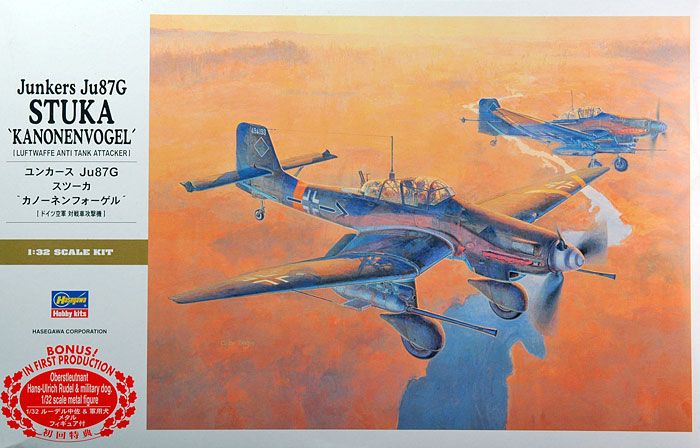
Hasegawa 1/32
S
u m m a r y
|
| Catalogue Number: |
Kit No. ST25 |
| Scale: |
1/32 |
| Contents and Media: |
208 parts in grey injection moulded
styrene (24 not used); 8 parts in clear; 5 parts in white metal; 4 polythene caps; markings for
two aircraft |
| Price: |
5,600 Yen |
| Review Type: |
FirstLook |
| Advantages: |
Accurate; robust parts
breakdown; crisply recessed panel lines and subtle lines of rivets; raised
surface detail where appropriate; well detailed including separate
aileron and flap actuators; parts included for G-1 and G-2 variants; very thin and clear canopy parts; engineered for
more variants in the future; no inserts. |
| Disadvantages: |
|
| Recommendation: |
Highly Recommended |
Reviewed by Brett Green

Hasegawa's 1/32 scale Junkers Ju 87G Stuka will be available for pre-order from Squadron.com
Hasegawa continues its commitment to large-scale
Luftwaffe models with its brand-new 1/32 scale Junkers Ju 87G 'Kanonvogel'.
I was excited at the prospect of a new, big family
of Stukas, but I admit to being a little disappointed that the G was
first in line. In fact, I only added the Ju 87G as an afterthought to a
couple of other kits that I was ordering from Japan.
Opening the box instantly reversed my initial
apathy.
In my opinion, this kit demonstrates perhaps the
best surface detail that Hasegawa has yet delivered (you will, however,
note that I have carefully included the words "in my opinion", as the
beauty of surface detail seems to be largely in the eye of the
beholder). Hasegawa has supplemented their usual crisply recessed and
restrained panel lines with a new feature - rows of very subtle rivets
on all external metal-skinned surfaces. For the most part these lines
follow panels, but in some cases they represent the sole surface
features. I really like this effect, especially when applied to the
brawny, purposeful lines of the Stuka.
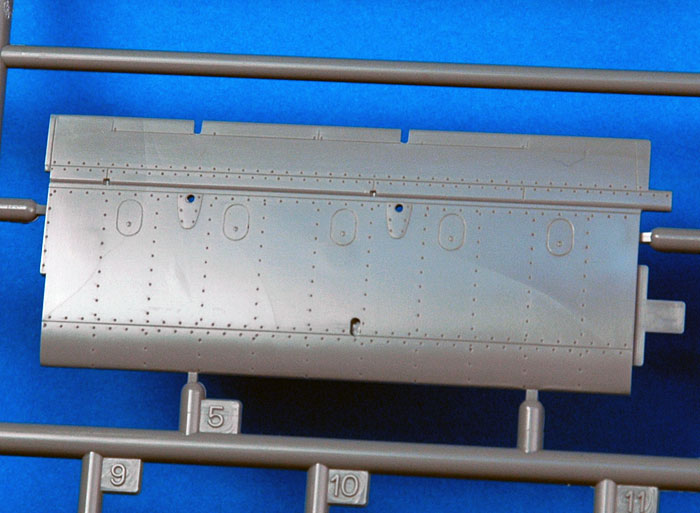
Click the
thumbnails below to view larger images:
The large box is chock-a-block full. 208 grey plastic
parts are spread amongst 15 sprues. 41 of these parts are marked "not
for use". Eight parts are supplied in clear plastic, and the initial
Japanese release also includes a nicely cast white metal figure of
Obstlt. Rudel and his Alsatian dog.
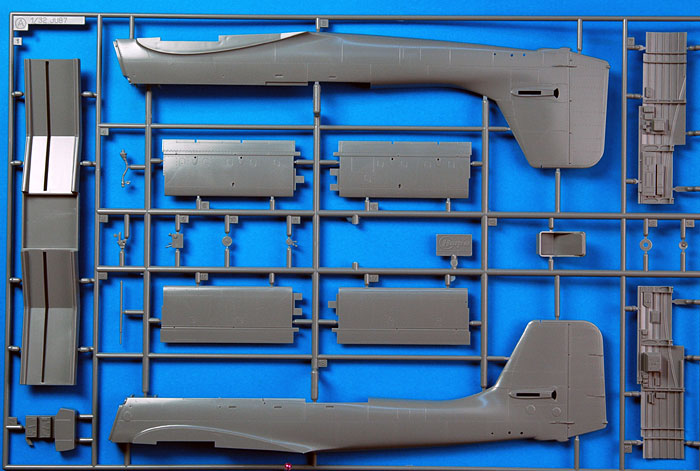
Click the
thumbnails below to view larger images:
As mentioned, surface detail on all the parts is
superb. There are no sink marks or ejector pin marks in visible areas.
Detail is generally very good, although the cockpit
could so with a little help with the radios, the twin 7.92 machine guns
(especially the gunsights) and the sidewalls. The after-market industry
will undoubtedly leap on this detailing opportunity in short order. The
big cannon pods are likewise quite nice straight from the box, but some
time spent adding wiring will be worthwhile. Hasegawa has thoughtfully
moulded the muzzle brake in two parts so the end is hollow, but the
prominent cooling holes are represented as recessed circles on the
plastic parts. The landing flaps and ailerons are supplied separately,
and the actuators are also separate - very pleasing to see these
prominent details handled so well. The tail wheel assembly is nicely
detailed in five parts, including a separate tie-down hook.
The only option offered is to build either the G-1
variant with short wing tips, or the G-2 with long wing tips.
Wing bombs, wing racks and dive brakes are included
but marked "not for use". You don't need to be Sherlock Holmes to figure
out that these parts will be used in a future D, and possibly B/R
releases.
Two seated plastic crew figures are included. Both
seem remarkably cheerful considering their dangerous assignment!
Clear parts are very thin and free of distortion.
Frame lines are mostly marked on the inside, which is quite correct for
the Stuka. Hasegawa also supplies decals to be applied to the inside of
the canopy - another nice touch.
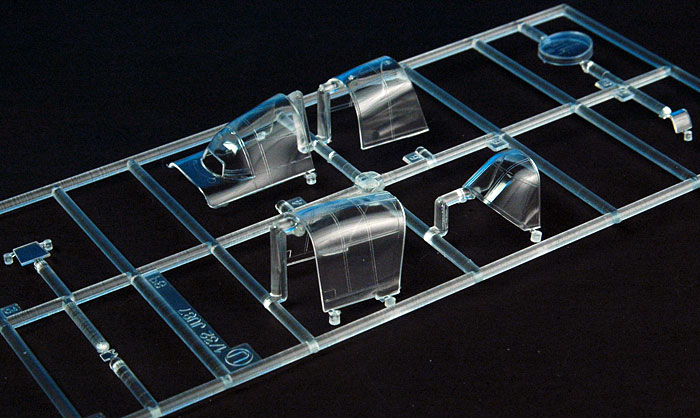
The shape of the overall airframe looks very good. I am certain that
we will see a very detailed analysis of the profiles and contours of
important details including the spinner, prop blades and more over the
coming months.
Kit engineering is necessarily robust. A chunky
spar supports the wing parts and should ensure the perfect angle for the
characteristic reverse gull.
Markings are supplied for two aircraft - Rudel's <- +
-, and GS + MD.
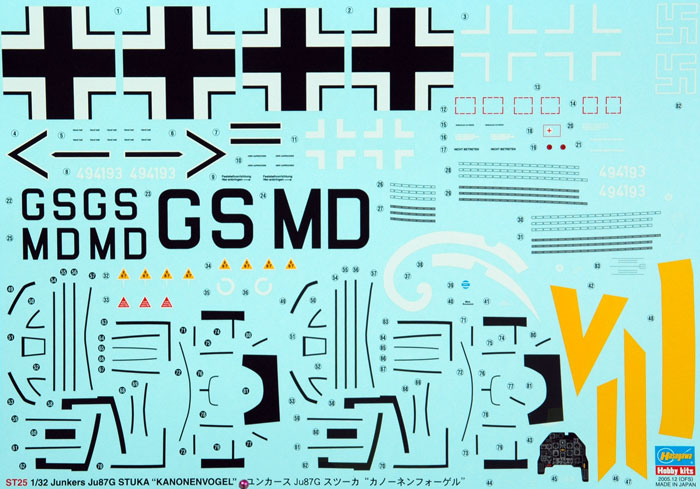
Both aircraft are finished in 70/71/65. Hasegawa
supplies full-size templates for camouflage masks on the inside rear
page of the instructions.
Hasegawa has adopted a consistent strategy of
designing their new 1/32 scale kits to be accurate in outline, simple to
build, reasonably detailed and affordable. Indeed, their recent Fw 190A/D and Bf
109G/K kits have not been equipped with astonishing detail, multimedia parts,
movable control surfaces, retracting undercarriage, flashing lights or
engine sounds.
They have, instead, focused on the basics; and
modellers have built these kits in extraordinary numbers.
Hasegawa's new 1/32 scale Ju 87G continues
this approach. At 225 parts, the big new Stuka is more complex than the
earlier 109 and 190 kits, but the construction sequence is not scary at
all. This looks to be an eminently buildable kit.
Hasegawa has also clearly taken a look at good hard
look at comments on their earlier 1/32 scale efforts and the newly
emerging competition. The revised surface detail, with rows of subtle
rivets, seems to be a direct response to both a current modellers' trend
and the standard approach of their Chinese rival. It is also pleasing to
see that some areas that had been typically oversimplified in earlier
kits (such as the tailwheel) received more thorough treatment on this
new Stuka.
After-market companies have embraced 1/32 scale with a flood of updates,
conversions, alternate markings and improved parts for modellers who want
a more detailed result. I am sure that we
won't be waiting long to see superdetailed cockpits, unspatted
undercarriage legs, perforated muzzle brakes and more for Hasegawa's big
Stuka.
Also, the parts breakdown suggests that we will see a
Ju 87D as well as B/R variants some time in the future.
Congratulations Hasegawa. In my opinion (for all
that is worth), you have once again applied the magic formula for bringing joy to
the heart of the New Age Luftwaffe Modeller!
Highly Recommended.
Review kit purchased with the
Editor's funds
Review and Images Copyright © 2005 by
Brett Green
Page Created 03 January, 2006
Last updated 03 January, 2006
Back to HyperScale Main Page
Back to Reviews Page
|
Home | What's
New | Features
| Gallery |
Reviews | Reference
| Forum
| Search